Al-Zaytouna Centre for Studies and Consultations held on 3/11/2021 a webinar hosting Isma‘il Haniyyah, the head of Hamas political bureau, who presented a paper entitled “Hamas’s Future Vision for the Advancement of the Palestinian National Project.” The webinar was moderated by Prof. Dr. Mohsen Mohammad Saleh, the General Manager of al-Zaytouna Centre, while a group of specialists in the Palestinian and strategic affairs commented on Haniyyah’s paper.
Haniyyah addressed the Palestinian situation and the obstacles facing the Palestinian national project. He talked about four variables that have had direct and indirect effects on the nature of the conflict, the occupation and the resistance project. They are namely the disruption of the Palestinian elections, the Sword of Jerusalem battle, the US withdrawal from Afghanistan, and the Arab-Israeli normalization agreements. He called for the agreement on a political program for the current stage, in which all factions, elites and independent figures would participate.
Haniyyah asserted that the Palestinian people have many elements of strength. They are the reservoir of revolution and the incubator of resistance.
Haniyyah stressed that the resistance is one of the elements of the strength of our people, and the world has witnessed the ability of the people to accumulate strength and establish it as a strategy. He said that when the resistance in the besieged Gaza Strip (GS) possesses missiles capable of striking any spot in historic Palestine, we must realize then, the extent of its ability to deter the occupation which—despite its capabilities—has a fragile structure and internal crises.
Haniyyah touched on five challenges that have led to the decline of the national project, namely the Oslo Accords; the recognition of the occupation and dealing with it; the decline of the role of the Palestinian leadership institution; the decline of the resistance as a strategic option for the Palestinian leadership; considering the peace process as the only option; and the decline of the Arab role and normalization with the occupation.
He stressed that the national project has become flawed after Oslo, while the goals, means, the state, borders and the function of the PA were disturbed, leading to defects in the Palestinian landscape.
Haniyyah said that the Oslo Accords and the security coordination of the Palestinian Authority (PA) with the occupation have paved the way for Arab countries to normalize with Israel, and for the possibility of the occupation joining as an observer member in the African Union.
He warned that the Palestinian leadership does not consider the resistance a strategic option anymore, and that they consider the peace process as the only option. They have lost important cards by not pairing political action with field resistance work. He pointed to the imbalanced role of the Palestinian leadership institution, and the declining role of the Palestine Liberation Organization (PLO), which has been limited to the PA. This has contributed to the Arab retreat and the daring to recognize Israel and normalize relations with it. However, at the same time, Haniyyah warned against spreading despair and frustration among the Palestinian people and the Ummah (the Muslim nation).
Haniyyah presented Hamas’s future vision to advance the national project through achieving five elements: namely bringing back into consideration the national project; agreeing on the fundamentals and goals; rebuilding the Palestinian leadership represented by the PLO, on new administrative foundations that would include all Palestinian components, in Palestine and abroad; agreeing on a political program for the current stage and a struggle strategy; and reconsidering the Palestinian cause and national project in its Arab, Islamic and international dimensions. He explained that this would require reformulating the function of the PA.
Haniyyah said, “We have to agree on a political program for the current stage, based on the common grounds and signed agreements, and we have a political legacy through which we can agree on a political program.”
He stressed the importance of agreeing on a combative strategy that combines diplomatic action with resistance, including popular resistance. Haniyyah expressed the readiness to engage in popular resistance in the West Bank (WB) that would develop into an Intifadah against the occupation.
Haniyyah announced Hamas’s readiness to engage in a genuine process of rebuilding the PLO, and building a unified leadership until the completion of the Palestinian National Council.
Hani al-Masri, Director-General of the Palestinian Centre for Policy Research and Strategic Studies (Masarat), commented on Haniyyah’s presentation, warning against wasting a historic opportunity provided by the Sword of Jerusalem battle (May 2021) to revive the Palestinian national project, and this calls for the need to draw lessons. Al-Masri pointed out to the clear and obvious contradiction between the resistance project adopted by Hamas, and the PA project based on the Oslo Accords, security coordination with the occupation, the recognition of Israel and economic dependency. He said that since these two projects cannot meet, especially after the 14-year-old schism, then the problem is not with the players, but rather with the game’s basis. Al-Masri wondered whether the solution would be in the formation of a broad national front that would establish national unity on the ground and force the Palestinian leadership to follow a different path.
Prof. Dr. Walid ‘Abd al-Hay, an expert in futures studies, asserted that the Hamas leadership should form a team to identify the Low Probability-High Impact events that may occur in the next ten years. This team would determine how to deal with these events, if they occur, how to mitigate their effects, determine their mutual impact, and estimate their occurrence probability. Among the most prominent of these events are: the Ramallah-based PA would consider GS rebellious against “legitimacy,” and request the help of international powers to strip it of its weapons and force its submission to the PA; a bloody conflict would occur between the Palestinian security forces in case ‘Abbas became absent for any reason; the PA’s temporary acceptance of self-rule in WB; and the expansion of Arab normalization with Israel to include new and important countries. ‘Abd al-Hay asked, “Where is the middle point in the negotiation between the security coordination agencies and the resistance cells?”
‘Atef al-Joulani, writer, researcher and editor-in-chief of Assabeel website, emphasized the importance that this vision is represented by the head of the political bureau of Hamas. He said that the vision came after the Sword of Jerusalem battle, and it involved a lot of balance and realism without being affected by the state of victory, especially since opinion polls have indicated that Hamas’ popularity among Palestinians has boosted. He reiterated the need for other political forces to present their vision for the advancement of the Palestinian national project, so that discussing personal issues would stop and instead ideas and a consensual vision that achieve unity and lead the next phase, would be discussed.
These comments were followed by the interventions and questions of the participants, including Muhannad Mustafa, Sari Orabi, Raed Nua’irat, Wael Najm, Ziad Bheis, Ahmad Sabahi and Wael El Mabhouh. Afterwards, Haniyyah concluded with responses and clarifications to the questions and comments.
Arabic language:
Arabic language:



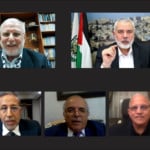
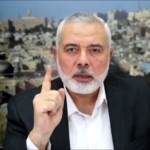
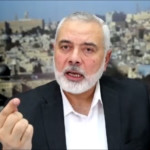
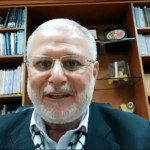
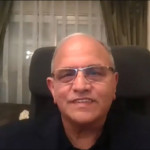
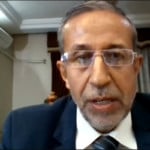
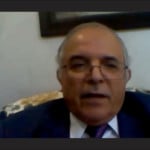
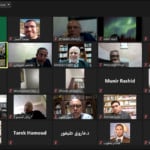

Leave A Comment